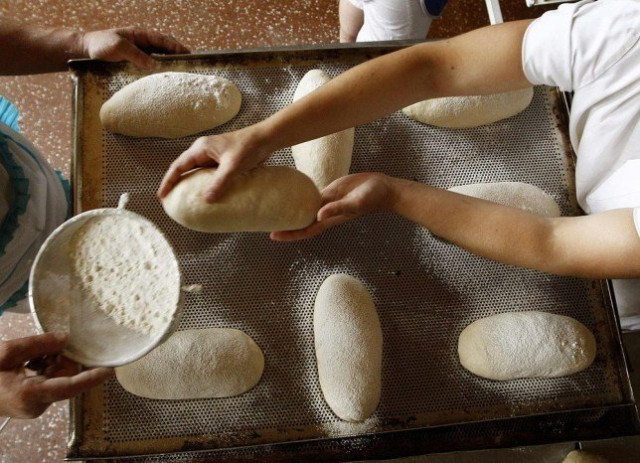Probe faults coalition partner for flour crisis
Investigation bodies also blame provincial food depts for price hike

PHOTO: REUTERS
In their preliminary reports, they pointed out that negligence of the provincial food departments was also responsible for the flour price hike even though sufficient wheat stocks were available in the country.
Despite a shortage of wheat in the open market, the Punjab food secretary did not allow an increase in flour mills’ daily quota for 18 days without taking into consideration the need to maintain flour availability.
Opposition comes hard on govt over flour crisis
As the wheat price went up in the open market, chakki owners fixed the price at Rs70/kg.
Until mid-Nov, wheat was available in Lahore’s open market at Rs1,550 per 40kg. The mill owners were producing flour from wheat purchased in addition to that provided under the government quota. Therefore, the flour being sent to Peshawar was not adversely affecting the local market.
In the last week of Nov, when the open market price started to rise, the Flour Mills Association informed the provincial food department that wheat quota needed to be increased.
However, a flour mill owner from Rawalpindi, who is a key figure in the PTI’s coalition partner in Punjab, called up the provincial food secretary telling him to reduce the quota of mills in Lahore and increase it in Rawalpindi.
However, the food director told the food secretary that there was no reason for raising Rawalpindi's quota as the flour mills there were sending a lot of flour to Peshawar.
Chakki owners to sell flour on govt rates
A few days later, a provincial minister associated with the same coalition partner called up a senior officer of the food department to express his displeasure.
He insisted that the quota for Lahore’s mills be reduced to 10 bags and increased to 10 bags for Rawalpindi’s mills.
On the minister’s direction, the food department reduced the daily quota for Lahore’s flour mills from 50 to 45 bags per roller body and it was from 25 bags to 30 bags per roller body for Rawalpindi's mills. The decision affected the flour supply in Lahore.
The manager of the mill owned by the important individual in the coalition party called up the food department officers and demanded a change in quota policy for 180 flour mills of Rawalpindi division.
According to the reports, Food Secretary Waqas Mehmood started negotiating with the Flour Mills Association for a reduction in the flour price. He used the delay in increasing the quota as a tool to pressure the association.
CM warns of profiteering over naan
As these talks went on for 15 days, the wheat price in the open market rose from Rs1,700/40kg to Rs1,950/4kg.
The mills in Lahore, which had sold large quantities of their private wheat because of their high sales, stopped producing flour.
The supply to Peshawar continued and flour ran out in the Lahore market. In addition, chakki owners also increased the price.
Other officers of the food department were advised to raise the quota immediately after being informed about the shortage, but the food secretary kept delaying the increase.
The reports further stated that when the price of wheat reached Rs1,950/40kg in the open market, mill owners had to buy refined wheat at Rs2,100/40kg and they decided to increase the price of chakki flour from Rs64/kg to Rs70/kg.
The investigation bodies also found that the Sindh food department had displayed extraordinary laziness in lifting wheat from the Pakistan Agricultural Storage and Services Corporation (Passco) and delivering it to flour mills.
The flour crisis in Khyber-Pakhtunkhwa was caused by the check-posts on the borders of Punjab, preventing the transport of the commodity.
In Balochistan, the provincial government did not buy wheat from Passco refusing to accept its price that increased the prices of flour in the province.
Punjab Chief Minister Usman Bazdar and Chief Secretary Azam Suleman Khan will brief the prime minister about the flour crisis on Sunday (today).












1724319076-0/Untitled-design-(5)1724319076-0-208x130.webp)






COMMENTS
Comments are moderated and generally will be posted if they are on-topic and not abusive.
For more information, please see our Comments FAQ